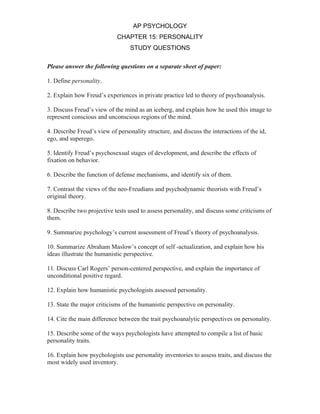
AP Psych Chapter 15 Personality Study Questions
- 1. AP PSYCHOLOGY CHAPTER 15: PERSONALITY STUDY QUESTIONS Please answer the following questions on a separate sheet of paper: 1. Define personality. 2. Explain how Freud’s experiences in private practice led to theory of psychoanalysis. 3. Discuss Freud’s view of the mind as an iceberg, and explain how he used this image to represent conscious and unconscious regions of the mind. 4. Describe Freud’s view of personality structure, and discuss the interactions of the id, ego, and superego. 5. Identify Freud’s psychosexual stages of development, and describe the effects of fixation on behavior. 6. Describe the function of defense mechanisms, and identify six of them. 7. Contrast the views of the neo-Freudians and psychodynamic theorists with Freud’s original theory. 8. Describe two projective tests used to assess personality, and discuss some criticisms of them. 9. Summarize psychology’s current assessment of Freud’s theory of psychoanalysis. 10. Summarize Abraham Maslow’s concept of self -actualization, and explain how his ideas illustrate the humanistic perspective. 11. Discuss Carl Rogers’ person-centered perspective, and explain the importance of unconditional positive regard. 12. Explain how humanistic psychologists assessed personality. 13. State the major criticisms of the humanistic perspective on personality. 14. Cite the main difference between the trait psychoanalytic perspectives on personality. 15. Describe some of the ways psychologists have attempted to compile a list of basic personality traits. 16. Explain how psychologists use personality inventories to assess traits, and discuss the most widely used inventory.
- 2. AP PSYCHOLOGY CHAPTER 15: PERSONALITY STUDY QUESTIONS 17. Identify the Big Five personality factors, and discuss some of the strengths of this approach to studying personality. 18. Summarize the person-situation controversy, and explain its importance as a commentary on the trait perspective. 19. Explain why psychologists are interested in the consistency of the trait of expressiveness. 20. Describe the social-cognitive perspective, and explain how reciprocal determinism illustrates that perspective. 21. Discuss the effects of a perception of internal or external control, and describe the concept of learned helplessness. 22. Discuss the link between performance and optimistic or pessimistic attributional style, and contrast positive psychology with humanistic psychology. 23. Explain why social-cognitive researchers assess behavior in realistic situations. 24. Summarize the criticisms of the social-cognitive perspective. 25. Explain why psychology has generated so much research on the self, and give three examples of current research on the self. 26. Give two alternative explanations for the positive correlation between low self-esteem and personal problems. 27. Discuss some ways that people maintain their self-esteem under conditions of discrimination or low status. 28. Discuss some evidence for self-serving bias, and contrast defensive and secure self- esteem.
